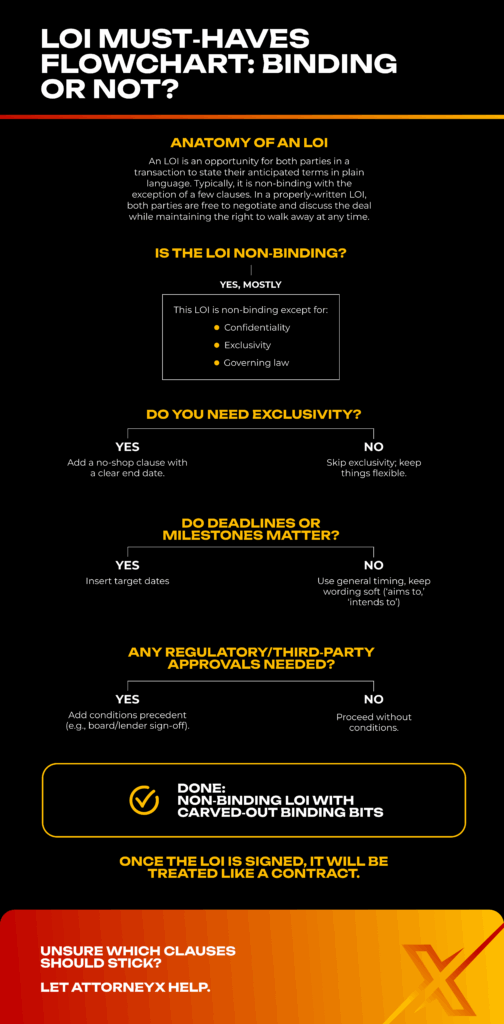Table of Contents
A letter of intent, also called an LOI, memorandum of understanding, or term sheet, outlines the basic terms of an agreement between two parties. It is one of the most important first steps in business negotiations, enabling the parties to get a feel for what the other wants, in order to come to a formal agreement. Ultimately, an LOI creates a basic framework in “Plain English” that is modified over time and through negotiations until a formal contract is possible.
What is a letter of intent? It may seem that you should simply create a formal contract and work towards agreeing to the terms. However, depending on the letter of intent format, it can prove to be an eye-opening tool that enables people to come together to decide on a transaction or to move apart from such situations if there is limited meeting room in the middle.
Why Do Businesses Use Letters of Intent?
A business uses a letter of intent when two parties expect to work together to create or form a deal. The goal of an LOI is to clarify where everyone stands at this point, define key points of the details that must be negotiated skillfully, and protect all of those involved.
Writing a letter of intent enables an announcement of the nature of the details. For example, it may be a joint venture, or it could be a sale of the business. A letter of intent to purchase enables companies to clarify what they need for the transaction to move forward, but it does not create formal details that clarify every point of the terms and conditions that a formal contract will later.

Common Scenarios When Letters of Intent Are Used
Once you learn how to write a letter of intent, it is possible to formulate them for a variety of needs. Some of the most common times to use such a document include:
- Mergers and Acquisitions: A letter of intent to purchase a business, sell a business, or merge two businesses is a very common initial step in this legal process.
- Joint Ventures and Partnerships: A letter of intent aids in the creation of an idea for a joint venture or partnership, allowing parties to work out the responsibilities, limitations, and any other concerns before a formal contract occurs.
- Commercial Real Estate Deals: LOIs can be a stepping stone in purchasing commercial real estate, enabling the seller and buyer to work out fine points of the transaction before a formal deal occurs.
- Hiring of Executive Officers: A letter of intent for business leadership changes, such as onboarding critical staff or Board members, can help to propose a transaction to determine if there is an opportunity to move forward. For example, a letter of intent can be provided for an employee who is likely to be hired to ensure both parties are on the same page.
These are just a few of the main examples of the use of letters of intent for businesses.

What Is Typically Included in a Business Letter of Intent?
Considering the various uses for an LOI, knowing what a letter of intent includes can be a bit tricky. This is a document that is flexible in terms of what it can include, and it is not intended to define every single component of a transaction. This non-binding agreement typically includes the following:
- Proposed transaction details
- The proposed price or expected value of the transaction
- The structure of how payment might work, such as an upfront purchase, a promissory note, or other terms important to the deal
- The nature of the sale, such as a merger, purchase of a business, sale of assets, or other specific goals
- Closing conditions, including any details critical to facilitating the closing
- Timeline expectations for any steps within the process
Some will include binding terms, such as a nondisclosure agreement to protect confidentiality and exclusive negotiation rights for the buyer. Many will also include terms that govern the buyer’s rights to gather data to complete due diligence before formalizing the contract.
How long should a letter of intent be? It should be long enough to outline the specifics agreed upon and the areas that need work. In short, there is no formal rule for its length. In general, we see many of them, which are between two and three pages in length.
Pros and Cons of Using a Letter of Intent in Business
Determining whether you should create a letter of intent to purchase business assets or merge your company has both advantages and disadvantages associated with it. Before you make a decision, consult your LOI attorney. The benefits of a letter of intent to buy a business (or for other needs) include:
- Establish initial terms. An LOI sets the stage. Before investing time and work into determining the financial or other benefits of any transaction, an LOI enables the clarification of key aspects. This includes factors such as purchase price, loan amounts, and closing dates.
- Tackle the big issues. Using an LOI, it is possible to talk about the big issues, or those elements of the transaction that must be resolved early on, or that the rest of the project will not move forward. Having this step in place means all efforts are going to be made to determine if the transaction can happen.
- Creates good faith. Another advantage is that an LOI creates a good-faith relationship. It is not a legally binding contract, but it shows what you are willing to do, and the seller can see what your intentions are.
Ultimately, an LOI creates the clarity necessary to move towards a deal. LOIs can be presented to the buyer or seller, their Board members, or others to determine if the transaction is worth considering or what circumstances should be adjusted to make it possible.
Cons of an LOI
The drawbacks of an LOI are notable, such as:
- It could become legally binding. In some situations, the intent of the LOI is to formalize the sale. That means the parties are likely to have agreed to all terms. In those cases, the court may decide that it is a done deal. This risk is minimized with proper language and formatting of the LOI.
- It means showing what you have to offer. Once you create an LOI, the buyer or seller knows exactly what you are offering. It exposes your business plans to competitors and customers alike.
- In some cases, they are dealing with shopping rather than serious offers. LOIs should document the seriousness of the transaction. However, some parties use them just to “shop for a deal.”
Considering these factors, you may be unsure if you want to use a letter of intent for business purchase or other transactions. Note that you can create an LOI that is protective of your rights and minimizes risks if you use a business attorney to carefully craft the document for you.
Is a Letter of Intent the Same as a Contract?
A letter of intent for the purchase of business assets is not the same as a formal contract, also known as a “definitive agreement.” A formal contract typically provides for more details, exacting terms and conditions, and expected outcomes. In most situations, a LOI is not legally binding (though parts of it could be, depending on how it is designed).
If you are ready to move forward with an agreed-upon transaction, a formal contract is necessary. If you are not at that point yet, but you want your offer or opportunity to be considered, an LOI can create that starting point for your further research and building of a deal.
However, in all situations, it is critical to meet with an attorney to discuss your objectives for the transaction.
How AttorneyX Can Help with Letters of Intent
Before you create an LOI or formal contract, contact AttorneyX to learn how we can help you protect your business transactions. An attorney will review your objectives and goals behind the use of an LOI. Then, your lawyer will help you format the letter of intent for the purchase of business assets in a way that is going to minimize any confusion and ensure the best possible outcome for you.
Without oversight from an attorney, you may be setting yourself up for mistakes that could lead to costly outcomes down the road.
Note that an LOI for a business purchase still should be clearly researched, documented, and backed with data. This is not just a “what if” document but one to take seriously if you are moving forward with the transaction. Your attorney will help you build a document that fits your specific purpose.
Talk to an Attorney Before You Sign a Letter of Intent
Before you use a sample LOI for business purchase online or craft your own “nonbinding” document, turn to an attorney. Let your lawyer help you determine the best possible strategy for you in this situation, including whether an LOI is a good option for you or if it could expose you to too much risk.
Turn to AttorneyX to discuss your situation. Let us help you build a strong offer, LOI, or formal contract that is representative of your objectives. When you contact us, you can expect to get answers to your questions and honest insight.



